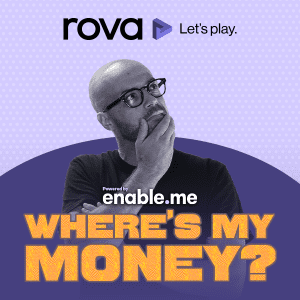Where's My Money Season 3, Episode 7
Epic Mortgage Plans: Smash Debt Like a Pro

Season Three of the multi-award-winning podcast Where’s My Money? is done and dusted, and here we bring you the hot tips shared by host Reagan White and his guests over the season.
enable.me partners with rova to bring this podcast to life and stimulate the conversation about finances with everyday Kiwis. Where’s My Money? follows the story of Reagan – a man chasing the Kiwi Dream but feeling stuck living month-to-month – and his discussions with the experts about what he may be doing wrong and how to fix it.
One man. One million dollars of debt. One podcast to find a way out.
Can the average Kiwi still be mortgage-free?
In a time where mortgage interest rates are front of mind, Where’s My Money? host Reagan White kicks off this episode with a relatable question for many listeners:
“Is it realistic for the average Kiwi to aim to be mortgage free – or has the game changed so much we’re kind of screwed?”
He’s joined by enable.me financial coaches Shelley Palman and Justin Gauci, who waste no time digging into this common fear.
Stop leaking money: Plug the gaps first
The first step in turning mortgage panic into mortgage progress is making sure your everyday money isn’t dripping away unnecessarily.
Small, seemingly harmless habits – like too many top-up grocery runs or blindly auto-paying utilities – can cost households thousands over the long term.
“We want to try and capture that [frittered money] and channel it towards debt,” Shelley says.
Audit your household spending, trim the waste, review your bank settings. Make sure every dollar is being put to work – not just flowing away unnoticed.
Know your mortgage. Like, really know it.
Most people assume a 30-year mortgage is standard, fixed, and unchangeable – a financial sentence, not a strategy. Shelley says this belief is both widespread and wildly unhelpful.
“The system in this country doesn’t really work anymore. So, you cannot be complacent, you cannot just follow that system, because it doesn’t work,” she adds.
Understanding your actual position – your remaining term, your interest structure, your repayments – can help you determine your options and create a personalised strategy. With the right guidance, many Kiwis could reduce their term and total interest paid without dramatically changing their lifestyle.
When the market drops, keep your cool
Justin Gauci adds his calm, seasoned voice to the conversation, especially when it comes to the fear factor.
With house prices dipping and market uncertainty rising, it’s easy to panic when your property value takes a hit – but Justin reminds listeners that unless you’re planning to sell, that number is just ink on paper.
“You can’t control whether your suburb is going to go through the roof or not… keep chipping away and keep [the bank] happy, they know there are cycles in markets,” Justin comments.
Focus less on the headlines and more on your own goals. Whether your home’s worth goes up or down this year, your mortgage strategy is about long-term structure – not short-term fear.
Build a plan that works for you
A good mortgage strategy isn’t about doing what everyone else does – it’s about understanding your goals, your household habits, and your unique financial picture.
With the right coaching and some structure behind your decisions, being mortgage free is still possible.
The trio close out the episode with a message to listeners:
Reagan: “Change your mindset, it’s not all doom and gloom, right?”
Shelley: “And get excited about what we can do, instead of what might happen.”
Justin: “If you think there’s an opportunity there, and you’ve explored that opportunity, be brave, and take it.”
If your mortgage is stressing you out, this episode is your nudge to stop fearing the debt and start shaping the strategy.
Disclaimer: The Where’s My Money? podcast and the information shared by host Reagan White and his guests does not constitute individual financial advice. If you’re interested in receiving financial advice, you can book a consultation with an enable.me coach. Costs apply.